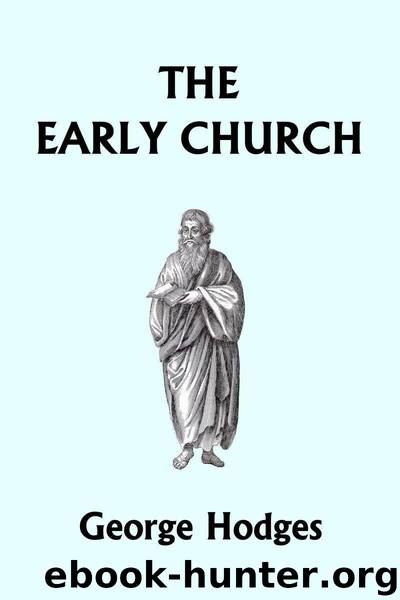The Early Church (Yesterday's Classics) by Hodges George

Author:Hodges, George [Hodges, George]
Language: eng
Format: epub
Tags: History
ISBN: 9781599151960
Publisher: Yesterday's Classics
Published: 2010-11-10T01:26:55.217000+00:00
II. The Monks of Annesi
In the middle of the fourth century, at a time when there were no communities of monks outside of Egypt, two young men at the University of Athens determined to take up the monastic life. One was named Basil, the other was named Gregory.
Cappadocia, the district from which these two men came, had an unsavory reputation in the contemporary world. Cappadocia, Caria and Crete were called "the three bad K's" (tria kappa kakista). Men who had their residence in more favored regions liked to tell how a viper bit a Cappadocian, and the viper died. It was a forlorn land, they said, buried under snow in winter, and inhabited by timid and treacherous people. It lay to the south of Pontus, the country so maligned by Tertullian in his attack on Marcion. Nevertheless, Cappadocia had already produced an eminent saint in Apollonius of Tyana, the account of whose life was read by the Neoplatonists as the Christians read the Gospels. And the glimpses which we get of the homes of these youths are revelations of good Christian living.
Basil's grandfather and grandmother had suffered in the Diocletian persecution, and for seven years had lived in the wild woods of Pontus. His father, a man of wealth, was a famous teacher of rhetoric; his mother was celebrated for her beauty. Of their nine children,—four sons and five daughters,—three sons and three daughters were canonized as saints. The son who did not become a saint was a lawyer, and attained eminence as a judge; nothing is known of the unsainted daughters. Basil was at first taught at home by his father, and then sent to school in the Cappadocian Cæsarea. There he met Gregory.
Gregory's father was a bishop, whose diocese consisted of his own little town. He had once belonged to an obscure sect in which Christianity was mingled with Persian and Hebrew elements; fire was revered as the symbol of God, and the Sabbath was rigorously kept. There were many such bishops, each in his village church, like the early Congregational ministers of New England. And there were many such sects, little experiments in Christian eclecticism. Gregory's mother, however, was a person of such strictness of devotion, and so remote, from any idea of compromise, that she would not even look at a pagan temple when she passed it in the street. She took him to church, from the days of his earliest childhood, and dedicated him to the ministry. She did not, however, have him baptized: that was not yet the rule. Presently he was sent to study in Cæsarea.
The two friends went up to the University of Athens: first Gregory, then Basil. Years after, when Gregory preached the sermon at the funeral of Basil, he recalled their student days together, and told how he protected Basil from the customary initiation of freshmen. It was a rough ceremony which ended with the subjection of the novice to an involuntary bath. "I kept him from being hazed at college," said Gregory, "when he was a freshman.
Download
This site does not store any files on its server. We only index and link to content provided by other sites. Please contact the content providers to delete copyright contents if any and email us, we'll remove relevant links or contents immediately.
Joan of Arc by Mary Gordon(3258)
Victory over the Darkness by Neil T. Anderson(2386)
The Gnostic Gospels by Pagels Elaine(2026)
Devil, The by Almond Philip C(1899)
The Nativity by Geza Vermes(1849)
The Psychedelic Gospels: The Secret History of Hallucinogens in Christianity by Jerry B. Brown(1826)
Going Clear by Lawrence Wright(1571)
Going Clear: Scientology, Hollywood, and the Prison of Belief by Lawrence Wright(1570)
Barking to the Choir by Gregory Boyle(1507)
A TIME TO KEEP SILENCE by Patrick Leigh Fermor(1499)
Old Testament History by John H. Sailhamer(1495)
Augustine: Conversions to Confessions by Robin Lane Fox(1473)
A History of the Franks by Gregory of Tours(1398)
The Knights Templar by Sean Martin(1393)
A Prophet with Honor by William C. Martin(1373)
The Bible Doesn't Say That by Dr. Joel M. Hoffman(1372)
by Christianity & Islam(1347)
The Amish by Steven M. Nolt(1253)
The Time Traveler's Guide to Medieval England by Ian Mortimer(1215)
